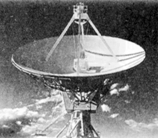
下载APP

【简答题】


阅读理解。

The rockets take astronauts and man-made satellites into space. The satellites are used for
communication, weather monitoring and research. But how do satellites stay up without falling down?
There are two opposite forces (力量) acting on the satellite. One of them is the force of gravitation
(地心引力), which tries to pull the satellite towards the earth. The other force is created by the rotation (旋转) of the satellite around the earth. This force tries to take the satellite away from the earth. With
these two forces, the satellite goes round and round. The gravitational pull of the earth (the force which
pulls everything towards the ground) is like a rope which keeps the satellite from flying away.
Everything that goes up has to come down. It is only a matter of time before a satellite comes back
to the earth. As time goes by, the satellite loses its speed, which makes the gravitational pull stronger
than the force pulling it away. This makes the satellite crash (坠落) down to the earth.
1. Which of the following uses of satellites is NOT mentioned?
A. communication
B. monitoring the weather condition
C. doing some research
D. taking pictures
2. The force that pulls the satellite towards the earth is created by ________.
A. the earth
B. the satellite itself
C. the rotation of the satellite
D. the rope
3. Why can't the satellites fly away?
A. Because of the force from the earth.
B. Because the satellite is too big.
C. Because of the force created by the rotation of the satellite around the earth.
D. Because people on earth have made ropes to tie the satellites tightly.
4. The satellite will finally crashes down to the earth ________.
A. when it flies faster
B. when its speed slows down
C. when people cut the rope
D. when there is no electricity in it
5. Which of the following is TRUE according to the passage?
A. There are four forces acting on the satellite.
B. The force of gravitation makes the satellite go round and round.
C. As time goes by, the satellite will finally fall down.
D. The satellite will stay in space forever.
参考答案:


参考解析:




刷刷题刷刷变学霸
举一反三

【多选题】旋转调强与下列哪些有关()
A.
在治疗过程机架做多次旋转
B.
机架每次旋转,MLC不改变大小
C.
机架每次旋转,MLC同时改变形状
D.
综合了MLC静态调强、MLC动态调强和断层治疗技术的优点
E.
利用铅挡块形成射野
【单选题】如果企业当前产业缺乏吸引力,而企业也不具备较强的能力和技能转向相关产品或服务,较为现实的选择就是采用( )。
A.
横向一体化
B.
纵向一体化
C.
离心多元化战略
D.
同心多元化战略

